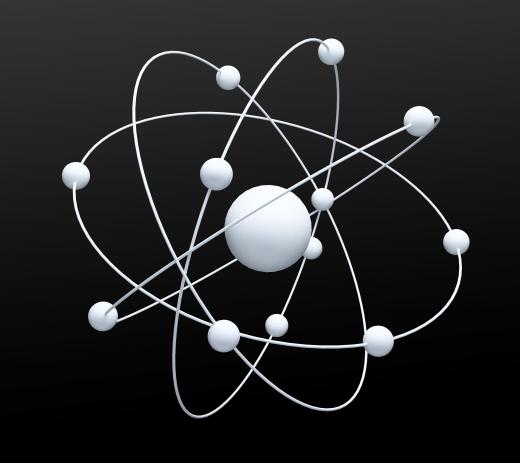What is Quantum Mechanics?
The term quantum mechanics (QM) generally refers to a mathematical formulation of quantum theory. It often describes and predicts the movement and behavior of particles at the atomic and subatomic levels. These include particles such as atoms, electrons, protons, and photons. According to QM, the behavior and movement of particles at these microscopic levels are counter-intuitive, radically differing from anything observed in everyday life. This requires a theory like quantum mechanics in order to better explain this different world.
In the macroscopic world, there usually are two types of phenomenon that are classified by scientists: particles and waves. Particles can be thought of as being localized, transporting mass and energy in their movements. Waves are a type of phenomenon that never is localized and has no mass, but nevertheless carries energy. The micro-world particles that are examined in quantum mechanics are different from those of the macro-world, because in certain situations, particles may act like waves, while conversely, waves may act like particles. According to QM, this would mean that on the quantum level an apple could behave like a wave, while a wave could behave like an apple.

Quantum mechanics uses the quantum unit to roughly assign and measure quantities of the physical properties of these particles. Particles generally are measured by considering the wave function recorded at the time of the measurement. Yet because particles may behave like waves, the simultaneous location or velocity of a particle can never completely be determined.
This apparent conundrum is known as Heisenburg’s uncertainty principle, which in other words states that position and momentum cannot be exactly measured simultaneously. This is not entirely because there are any limitations in measuring equipment or ability, but because this uncertainty is believed to be inherent to the particles themselves. Quantum mechanics therefore is a mathematical theory that tries to calculate probabilities according to the wave function.
Many scientists do not agree with the postulates of QM. Albert Einstein was a scientist who sometimes was critical of quantum theory, as it conflicted with his own theory. Thus, one of the biggest problems in contemporary physics is to create a theory that would unify the ideas of quantum mechanics with those of Einstein's general theory of relativity. Physicists such as Julian Barbour have proposed some innovative solutions to this problem, basically stating that if humans consider that time itself does not exist, there is no obstacle to unifying quantum mechanics and the theory of relativity.
AS FEATURED ON:
AS FEATURED ON:











Discussion Comments
I truly feel if you use light in your research you will see that there is a defining measurement and that this apparent conundrum known as Heisenburg’s uncertainty principle, (which in other words states that position and momentum cannot be exactly measured simultaneously) will no longer be valid. Light is the missing denominator.
Cece
I also think this is lacking a denominator. You stated that because particles may behave like waves, the simultaneous location or velocity of a particle can never completely be determined. However if you take into consideration the use of light, You can see why this would work. Push a tube of light forward. Until it's pushed forward the entire length of the tube. You don't see it at the other end. IT's the same with particles. I believe. Therefore if you factor in the length of the light, you can see exactly where your particle/wave is.
Cece.
What is the size of a quantum unit please? Also are there specific examples of when a particle acts like a particle versus when a particle acts like a wave? When does a wave become a particle and when does a particle become a wave? What was done at this leve? Was it done macroscopically or Microscopically? I have so many questions. Is there a specific point in time when this happens? I'm just beginning to study this. Thanks for any help you can give to me.
Cece
I think the whole point of quantum mechanics is that we don't understand it. There are serious gaps in our knowledge about our physical world - it seems we don't even have a basic knowledge of it yet. I hope we make a breakthrough in my lifetime, as I would die a more content man.
Oh man, I have a fair understanding of what Chaos Theory is and the Butterfly Effect, but I just can't wrap my head around quantum mechanics.
The whole apple example just does not compute for me.
I find Chaos Theory interesting but my total lack of even a smidgen of understanding for quantum mechanics is kind of a bummer.
Post your comments